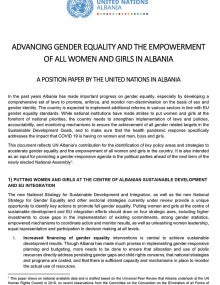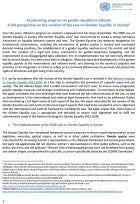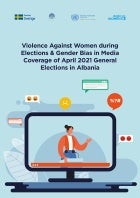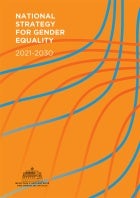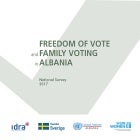1 - 11 of 11 Results
Date:
Since the launch of UN Women’s strategic note for Albania (2022–2026), UN Women Albania has made significant strides in enhancing its reach and impact across the nation.
Date:
A joint advocacy piece on the Gender Equality Law from the United Nations in Albania.
Date:
This publication describes UN Women Albania’s programme of work for the period 2022-2026. It highlights key areas of contribution of the Country Office across UN Women’s triple mandate of UN Coordination, normative support and operational activities.
Date:
A media monitoring study was conducted prior, during and after the general elections in Albania in 2021.
Date:
The National Strategy for Gender Equality 2021 – 2030 was developed on behalf of the Government of Albania by the Ministry
of Health and Social Protection, in coordination and consultation with other
responsible ministries, local self-governance units, independent institutions, civil
society organizations, academia, as well as international organizations that work
towards gender equality and ending gender-based violence and domestic violence
in Albania.
Date:
A joint position paper by United Nations in Albania identifying four key areas and strategies to accelerate gender equality and the empowerment of all women and girls in the country.
Date:
The report offers a concise, data-driven look at the implementation of the Beijing Platform for Action and issues a clarion call for stepping up progress to realize the promises of Beijing. It covers countries from the United Nations Economic Commission for Europe region and it is based on available data and information in the regional and global databases.
Date:
The report on “The impact of the COVID-19 pandemic on specialist services for victims and survivors of violence in the Western Balkans and Turkey: A proposal for addressing the needs” is a rapid assessment of specialist services to women who experienced violence to better understand the challenges posed to service delivery, as well as to explore new opportunities for innovative approaches in light of the COVID-19 pandemic. The rapid assessment was undertaken within the EU-UN Women Regional Programme “Implementing Norms, Changing Minds.”
Date:
Following the first survey (2014), which focused on the situation of women in Albania in regards to their voting behavior, the 2017 survey was conducted to elicit citizen opinions on different practices that might intervene with the freedom of voting as well as understand and identify the current systemic flaws behind the high occurrence of such practices.
Date:
This guide focuses on the scourge of violence against women in elections. It identifies specific components of violence against women in elections, including types, tactics, victims and perpetrators, and presents policy and programming options based on current good practices to ensure that women can exercise their political rights.
Date:
Gender Brief Albania 2016 gives an overview and analysis of gender equality in Albania. It captures on-going work, reviews progress and identifies gaps in implementing Albania’s international and national commitments on gender equality and the empowerment of women. To support EU policy makers in tailoring pre-accession assistance to the Government of Albania, it presents priority actions to improve the lives of Albanian women and girls in six key areas and identifies new, emerging sectors that require action.
